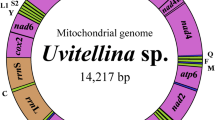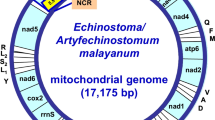Abstract
Trematodes can adversely impact the health and survival of wild animals. The trematode family Cyclocoelidae, which includes large digenean bird parasites, lacks molecular analysis, and reclassifications have not been supported. This study produced the first fully assembled and annotated mitochondrial genome sequence for the trematode Morishitium polonicum. The whole length of the M. polonicum (GenBank accession number: OP930879) mitogenome is 14083 bp, containing 22 transfer ribonucleic acids (tRNAs), 2 ribosomal RNAs (rRNAs, rrnL and rrnS), and a noncoding control section (D-loop) 13777 to 13854 bp in length. The 12 PCG areas have 3269 codons and a total length of 10053 bp, which makes up 71.38% of the mitochondrial genome’s overall sequence. Most (10/12) of the PCGs that code for proteins begin with ATG, while the nad4L and nad1 genes have a GTG start codon. Phylogenetic analysis using the concatenated nucleotide sequences of 12 PCGs, and the ML tree analysis results showed that M. polonicum is more closely related to with Echinostomatidae and Fasciolidae, which indicates that the family Cyclocoelidae is more closely associated with Echinochasmidae. This study provides mtDNA information, and analysis of mitogenomic structure and evolution. Moreover, we aimed to understand the phylogenetic relationships of this fluke.





Similar content being viewed by others
Data availability
All data and materials of the study are included in the manuscript and the supplementary data. The complete mitochondrial genome data of M. polonicum have been stored on the NCBI website under the accession number OP930879.
References
Bernt M, Donath A, Jühling F, Externbrink F, Florentz C, Fritzsch G, Pütz J, Middendorf M, Stadler PF (2013) MITOS: improved de novo metazoan mitochondrial genome annotation. Mol Phylogenet Evol 69:313–319. https://doi.org/10.1016/j.ympev.2012.08.023
Boore JL (1999) Animal mitochondrial genomes. Nucleic Acids Res 27:1767–1780. https://doi.org/10.1093/nar/27.8.1767
Cai XQ, Liu GH, Song HQ, Wu CY, Zou FC, Yan HK, Yuan ZG, Lin RQ, Zhu XQ (2012) Sequences and gene organization of the mitochondrial genomes of the liver flukes Opisthorchis viverrini and Clonorchis sinensis (Trematoda). Parasitol Res 110:235–243. https://doi.org/10.1007/s00436-011-2477-2
Chai JY, Jung BK (2019) Epidemiology of trematode infections: an update. Adv Exp Med Biol 1154:359–409. https://doi.org/10.1007/978-3-030-18616-6_12
Diaferia M, Giglia G, Mandara MT, Morganti G, Ceccherelli R, Veronesi F, Lepri E (2021) Morishitium polonicum as a cause of severe respiratory disease in Eurasian blackbirds (Turdus merula) in central Italy. J Wildl Dis 57:906–911. https://doi.org/10.7589/jwd-d-20-00163
Díaz EA, Donoso G, Mosquera JD, Ramírez-Villacís DX, González G, Zapata S, Cisneros-Heredia DF (2022) Death by massive air sac fluke (Trematoda: Bothriogaster variolaris) infection in a free-ranging snail kite (Rostrhamus sociabilis). Int J Parasitol Parasites Wildl 19:155–160. https://doi.org/10.1016/j.ijppaw.2022.09.001
Dronen NO (2007) Wardianum catoptrophori n. sp. (Digenea: Cyclocoelidae: Haematotrephinae) from the Willet, Catoptrophorus semipalmatus (Scolopacidae), from the Galveston, Texas area of the Gulf of Mexico, U.S.A. Comp Parasitol 74:35–40. https://doi.org/10.1654/4245.1
Dronen NO, Tkach VV (2014) Key to the species of Morishitium Wienberg, 1928 (Cyclocoelidae), with the description of a new species from the red-billed blue magpie, Urocissa erythrorhyncha (Boddaert) (Corvidae) from Guizhou Province, People's Republic of China. Zootaxa 3835:273–282. https://doi.org/10.11646/zootaxa.3835.2.7
Dronen NO, Blend CK (2015) Updated keys to the genera in the subfamilies of Cyclocoelidae Stossich, 1902, including a reconsideration of species assignments, species keys and the proposal of a new genus in Szidatitreminae Dronen, 2007. Zootaxa 4053:1–100. https://doi.org/10.11646/zootaxa.4053.1.1
Duan H, Gao JF, Hou MR, Zhang Y, Liu ZX, Gao DZ, Guo DH, Yue DM, Su X, Fu X, Wang CR (2015) Complete Mitochondrial genome of an equine intestinal parasite, Triodontophorus brevicauda (Chromadorea: Strongylidae): the first characterization within the genus. Parasitol Int 64:429–434. https://doi.org/10.1016/j.parint.2015.06.006
Galosi L, Heneberg P, Rossi G, Sitko J, Magi GE, Perrucci S (2019) Air sac trematodes: Morishitium polonicum as a newly identified cause of death in the common blackbird (Turdus merula). Int J Parasitol Parasites Wildl 9:74–79. https://doi.org/10.1016/j.ijppaw.2019.03.021
Gissi C, Iannelli F, Pesole G (2008) Evolution of the mitochondrial genome of Metazoa as exemplified by comparison of congeneric species. Heredity (edinb) 101:301–320. https://doi.org/10.1038/hdy.2008.62
Hayne CK, Schmidt CA, Haque MI, Matera AG, Stanley RE (2020) Reconstitution of the human tRNA splicing endonuclease complex: insight into the regulation of pre-tRNA cleavage. Nucleic Acids Res 48:7609–7622. https://doi.org/10.1093/nar/gkaa438
Jin S, Xia J, Jia F, Jiang L, Wang X, Liu X, Liu X, Geng Z (2022) Complete mitochondrial genome, genetic diversity and phylogenetic analysis of Pingpu Yellow chicken (Gallus gallus). Animals 12:3037. https://doi.org/10.3390/ani12213037
Kalani H, Kalani F, Faridnia R, Pestechian N, Mohaghegh MA, Mirzaei F, Sharif M, Daryani A (2015) The first report of Morishitium vagum (Trematoda: Cyclocoelidae) in Turdus merula in Iran. Helminthologia 52:293–296. https://doi.org/10.1515/helmin-2015-0045
Kearse M, Moir R, Wilson A, Stones-Havas S, Cheung M, Sturrock S, Buxton S, Cooper A, Markowitz S, Duran C, Thierer T, Ashton B, Meintjes P, Drummond A (2012) Geneious Basic: an integrated and extendable desktop software platform for the organization and analysis of sequence data. Bioinformatics 28:1647–1649. https://doi.org/10.1093/bioinformatics/bts199
Kirillova NY, Kirillov AA, Spiridonov SN, Grishutkin GF (2019) First finding of Morishitium polonicum (Trematoda, Cyclocoelidae) in Turdus merula and Coccothraustes coccothraustes in Russia. Nat Conserv Res 4(3):124–126. https://doi.org/10.24189/ncr.2019.054
Kumar S, Stecher G, Tamura K (2016) MEGA7: Molecular Evolutionary Genetics Analysis Version 7.0 for bigger datasets. Mol Biol Evol 33:1870–1874. https://doi.org/10.1093/molbev/msw054
Li Y, Ma XX, Lv QB, Hu Y, Qiu HY, Chang QC, Wang CR (2019) Characterization of the complete mitochondrial genome sequence of Tracheophilus cymbius (Digenea), the first representative from the family Cyclocoelidae. J Helminthol 94:e101. https://doi.org/10.1017/s0022149x19000932
Lin RQ, Liu GH, Hu M, Song HQ, Wu XY, Li MW, Zhang Y, Zou FC, Zhu XQ (2012) Oesophagostomum dentatum and Oesophagostomum quadrispinulatum: characterization of the complete mitochondrial genome sequences of the two pig nodule worms. Exp Parasitol 131:1–7. https://doi.org/10.1016/j.exppara.2012.02.015
Lowe TM, Chan PP (2016) tRNAscan-SE On-line: integrating search and context for analysis of transfer RNA genes. Nucleic Acids Res 44:W54-57. https://doi.org/10.1093/nar/gkw413
Na L, Gao JF, Liu GH, Fu X, Su X, Yue DM, Gao Y, Zhang Y, Wang CR (2016) The complete mitochondrial genome of Metorchis orientalis (Trematoda: Opisthorchiidae): comparison with other closely related species and phylogenetic implications. Infect Genet Evol 39:45–50. https://doi.org/10.1016/j.meegid.2016.01.010
Nicholls TJ, Minczuk M (2014) In D-loop: 40 years of mitochondrial 7S DNA. Exp Gerontol 56:175–181. https://doi.org/10.1016/j.exger.2014.03.027
Olson PD, Cribb TH, Tkach VV, Bray RA, Littlewood DT (2003) Phylogeny and classification of the Digenea (Platyhelminthes: Trematoda). Int J Parasitol 33:733–755. https://doi.org/10.1016/s0020-7519(03)00049-3
Page RD (1996) TreeView: an application to display phylogenetic trees on personal computers. Comput Appl Biosci 12:357–358. https://doi.org/10.1093/bioinformatics/12.4.357
Perna NT, Kocher TD (1995) Patterns of nucleotide composition at fourfold degenerate sites of animal mitochondrial genomes. J Mol Evol 41:353–358. https://doi.org/10.1007/bf00186547
Ramis SJ, Pinya S (2018) First record of Morishitium polonicum (Machalska, 1980) (Trematoda, Cyclocoelidae) parasitizing Turdus philomelos Brehm, 1831 in Mallorca (Balearic Islands, Spain). Boll Soc Hist Nat Balears 61:27–33
Reyes A, Gissi C, Pesole G, Saccone C (1998) Asymmetrical directional mutation pressure in the mitochondrial genome of mammals. Mol Biol Evol 15:957–966. https://doi.org/10.1093/oxfordjournals.molbev.a026011
Ronquist F, Huelsenbeck JP (2003) MrBayes 3: Bayesian phylogenetic inference under mixed models. Bioinformatics 19:1572–1574. https://doi.org/10.1093/bioinformatics/btg180
Seo BS, Lee Sh Fau - Chai JY, Chai Jy Fau - Hong SJ, Hong SJ (1985) Studies on intestinal trematodes in Korea XX. Four cases of natural human infection by Echinochasmus japonicus. Kisaengchunghak Chapchi 23:214-220. https://doi.org/10.3347/kjp.1985.23.2.214
Shutler D, Mallory ML, Elderkin M, McLaughlin JD (2016) Cyclocoelid ( Morishitium sp.) trematodes from an air sac of a purple sandpiper, Calidris maritima (Brünnich). J Parasitol 102:381–384. https://doi.org/10.1645/15-808
Sitko J, Bizos J, Heneberg P (2017) Central European parasitic flatworms of the Cyclocoelidae Stossich, 1902 (Trematoda: Plagiorchiida): molecular and comparative morphological analysis suggests the reclassification of Cyclocoelum obscurum (Leidy, 1887) into the Harrahium Witenberg, 1926. Parasitology 144:368–383. https://doi.org/10.1017/s0031182016001955
Sohn WM, Chai Jy Fau - Yong T-S, Yong Ts Fau - Eom KS, Eom Ks Fau - Yoon C-H, Yoon Ch Fau - Sinuon M, Sinuon M Fau - Socheat D, Socheat D Fau - Lee S-H, Lee SH (2011) Echinostoma revolutum infection in children, Pursat Province, Cambodia. Emerg Infect Dis 17:117-119. https://doi.org/10.3201/eid1701.100920
Suleman KMS, Heneberg P, Zhou CY, Muhammad N, Zhu XQ, Ma J (2019a) Characterization of the complete mitochondrial genome of Uvitellina sp, representative of the family Cyclocoelidae and phylogenetic implications. Parasitol Res 118:2203–2211. https://doi.org/10.1007/s00436-019-06358-y
Suleman MJ, Khan MS, Tkach VV, Muhammad N, Zhang D, Zhu XQ (2019b) Characterization of the complete mitochondrial genome of Plagiorchis maculosus (Digenea, Plagiorchiidae), representative of a taxonomically complex digenean family. Parasitol Int 71:99–105. https://doi.org/10.1016/j.parint.2019.04.001
Urabe M, Nor Hashim NE, Uni S, Iwaki T, Abdullah Halim MR, Marzuki ME, Mat Udin AS, Zainuri NA, Omar H, Agatsuma T, Uga S, Takaoka H, Azirun MS, Ramli R (2020) Description and molecular characteristics of Morishitium polonicum malayense Urabe, Nor Hashim & Uni, n. subsp. (Trematoda: Cyclocoelidae) from the Asian glossy starling, Aplonis panayensis strigata (Passeriformes: Sturnidae) in Peninsular Malaysia. Parasitol Int 76:102074. https://doi.org/10.1016/j.parint.2020.102074
Verhagen JA-O, Fouchier RAM, Lewis N (2021) Highly pathogenic avian influenza viruses at the wild-domestic bird interface in Europe: future directions for research and surveillance. Viruses 13:212. https://doi.org/10.3390/v13020212
Wang JJ, Li DF, Li H, Yang MF, Dai RH (2019) Structural and phylogenetic implications of the complete mitochondrial genome of Ledra auditura. Sci Rep 9:15746. https://doi.org/10.1038/s41598-019-52337-9
Wardeh M, Sharkey KJ, Baylis M (2020) Integration of shared-pathogen networks and machine learning reveals the key aspects of zoonoses and predicts mammalian reservoirs. Proc Biol Sci 287:20192882. https://doi.org/10.1098/rspb.2019.2882
Wenink PW, Baker AJ, Tilanus MG (1994) Mitochondrial control-region sequences in two shorebird species, the turnstone and the dunlin, and their utility in population genetic studies. Mol Biol Evol 11:22–31. https://doi.org/10.1093/oxfordjournals.molbev.a040089
Xu M, Zhou S, Wan X (2022) Phylogenetic implication of large intergenic spacers: insights from a mitogenomic comparison of Prosopocoilus stag beetles (Coleoptera: Lucanidae). Animals 12. https://doi.org/10.3390/ani12131595
Funding
This work was supported by the National Natural Science Foundation of China (No.81760607, U2002219), Yunnan Natural Science Foundation (2017FD139), and the Scientific Research Fund of Yunnan Education Department (2022J0687).
Author information
Authors and Affiliations
Contributions
The study was created by Shuang Liu, who also wrote the manuscript. The experiments were carried out, and the results were analyzed by Dandan Jiang, Bin Chen, Xinyan Lu, Kexin Peng, Shuang Liu, and Ling Geng. To the M.polonicum collection and debates, Xuan Wang and Chunhong Du all made contributions. The interpretation of experimental data, the critical revision of important knowledge content, and the final approval of the version to be published are the responsibility of Tianguang Ren and Xing Yang.
Corresponding authors
Ethics declarations
Ethics approval and consent to participate
Not applicable.
Consent for publication
Not applicable.
Competing interests
The authors declare no competing interests.
Additional information
Handling Editor: Una Ryan
Publisher's Note
Springer Nature remains neutral with regard to jurisdictional claims in published maps and institutional affiliations.
Rights and permissions
Springer Nature or its licensor (e.g. a society or other partner) holds exclusive rights to this article under a publishing agreement with the author(s) or other rightsholder(s); author self-archiving of the accepted manuscript version of this article is solely governed by the terms of such publishing agreement and applicable law.
About this article
Cite this article
Liu, S., Liu, Y., Chen, B. et al. The complete mitochondrial genome of Morishitium polonicum (Trematoda, Cyclocoelidae) and its phylogenetic implications. Parasitol Res 122, 2609–2620 (2023). https://doi.org/10.1007/s00436-023-07959-4
Received:
Accepted:
Published:
Issue Date:
DOI: https://doi.org/10.1007/s00436-023-07959-4




